Área de título y declaración de responsabilidad
Título apropiado
FHYA selection from the Bonner Series
Tipo general de material
- Objeto
- Documento textual
- Registro sonoro
Título paralelo
Otra información de título
Título declaración de responsabilidad
Título notas
- Fuente del título: FHYA using WITS materials
Nivel de descripción
Serie
Institución archivística
Código de referencia
Área de edición
Declaración de edición
Declaración de responsabilidad de edición
Área de detalles específicos de la clase de material
Mención de la escala (cartográfica)
Mención de proyección (cartográfica)
Mención de coordenadas (cartográfica)
Mención de la escala (arquitectónica)
Jurisdicción de emisión y denominación (filatélico)
Área de fechas de creación
Fecha(s)
-
2016 - (Online curation)
-
1970 - 1972 (Interview-recording)
Área de descripción física
Descripción física
- 67 Edited Typescripts
- 64 Notebooks
- 44 Original Collection Box Labels
- 39 Audio Tape Cassette and Case Labels
- 35 Original Collection Boxes
- 27 Audio Files
- 23 Index Cards
- 18 Folders
- 12 Rejected Edited Typescripts
- 12 Floppy Disk Labels
Área de series editoriales
Título apropiado de las series del editor
Títulos paralelos de serie editorial
Otra información de título de las series editoriales
Declaración de responsabilidad relativa a las series editoriales
Numeración dentro de la serie editorial
Nota en las series editoriales
Área de descripción del archivo
Historial de custodia
[Source - Chloe Rushovich for FHYA using Wits materials, 2017: In 1970, Philip Bonner recorded a series of interviews, as a part of his doctoral research at the School of Oriental and African Studies at the University of London, under the supervision of Professor Shula Marks. The interviews were undertaken with assistance from the Department of Local Administration, and on occasion with the help of individuals close to the Swazi king, namely uMntwanenkhosi Makhungu, an elder son of the monarch; Mangangene Dlamini, a noted Swazi historian; anthropologist Hilda Kuper, a close friend of the king; as well as Mr Tibamu; and John Dlamini. Mr. T. Simelane, a librarian based in Manzini, and Mr. F. Buckham, were responsible for the production of summaries of some of these interviews in typed form in English. The transcribers and translators were Johnson Sithole, Nokuthula Vilakati, John Dlamini, Nkonzo Hlatshwayo, Ruth Ndlela, Billy Mavimbela, P. Khumalo, Manganene Dlamini, and R. Sicheme Mamba. The group aimed for a form of transcription attentive as possible to dialect variation. The transcriptions were interleaved line by line with literal direct translations into English augmented by annotations as the transcriber-translator saw fit, and sometimes by further annotations by Carolyn Hamilton, who was a student of Bonner’s. The transcribers periodically added tape duration counter numbers to their texts. The group was assisted for a time by Michael Westcott, a then recent graduate of York University with a research interest in oral history. In the late 1980s and early 1990s Hamilton, assisted by an Archaeology graduate student, Ronette Engela, experimented with the possibility of editing the translations for publication. This process created a number of edited typescripts, but the project was not taken forward. In 2012, the Wits Historical Papers undertook to digitize the recorded interviews. This was made possible by a grant from the Carnegie Foundation. A full copy of the digitized recorded interviews was deposited by the Wits Historical Papers in the University of Swaziland Library. In 2014 the Five Hundred Year Archive commissioned Patricia Liebetrau, a metadata librarian who had worked on the Digital Imaging South Africa project, to undertake the digitization of a selection of the transcripts from the recordings made by Bonner.]
Alcance y contenido
[Source - Chloe Rushovich for FHYA using Wits materials, 2017: In 1970, Philip Bonner recorded a series of interviews, as a part of his doctoral research at the School of Oriental and African Studies at the University of London, under the supervision of Professor Shula Marks. Bonner’s work constitutes the earliest independent investigation of Swazi oral traditions and is informed by a set of concerns very different from those of earlier researchers. Not only do his interviews focus on regional specificities, but they address a set of issues shaped by the Africanist currents which influenced the writing of southern African history in Britain in the early 1970s. His work locating and recording local traditions served as a counter weight to the better-known royalist traditions. He also investigated Swazi oral traditions as much for what they could reveal about the Swazi interaction with the broader context of southern Africa as for what they say about internal Swazi relations. His research formed the basis of his thesis, as well as the book he subsequently published in 1983. In 1985, a selection of Bonner’s recordings was transcribed and translated in Swaziland by a number of students or graduates from the University of Swaziland working with Carolyn Hamilton. This process took place at the Swazi National Archives. In 2014 the Five Hundred Year Archive commissioned Patricia Liebetrau, a metadata librarian who had worked on the Digital Imaging South Africa project, to undertake the digitization of a selection of the transcripts from the recordings made by Bonner. The transcripts selected were those for which a typed-up summary or typed edited typescript already existed. The rationale for this was that the typed version, unlike the handwritten versions could be subjected to optical character recognition and are thus searchable. The linked typed texts therefore act as a kind of index to the handwritten texts and the recorded audio. This selection of transcripts, as well as the already digitized audio, the rejected experimental edited typescripts, and associated materials such as collection boxes, index cards, folders, audio tape cassettes and case labels, and notebooks, formed the FHYA selection from the collection of Bonner recordings. The Bonner series is separated into ‘files’ named after each interlocutor.]
Área de notas
Condiciones físicas
Origen del ingreso
Arreglo
Idioma del material
Escritura del material
Ubicación de los originales
Disponibilidad de otros formatos
Restricciones de acceso
Condiciones de uso, reproducción, y publicación
Creative Commons License: CC BY-NC-ND
https://creativecommons.org/licenses/by-nc-nd/3.0/
Unless otherwise stated the copyright of all material on the FHYA resides with the contributing institution/custodian.
Instrumentos de descripción
Finding Aids
Inventory for A2760
http://www.historicalpapers.wits.ac.za/?inventory/U/collections&c=A2760/R/6387




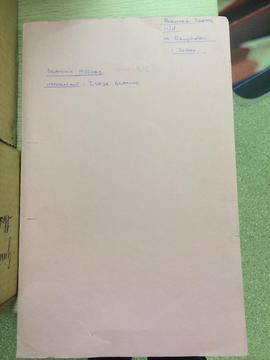
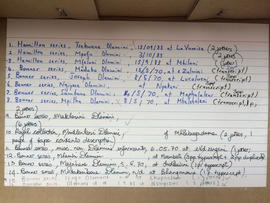


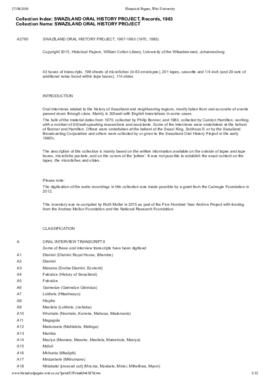





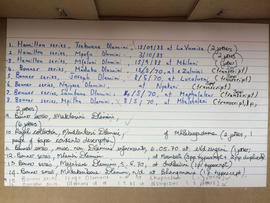


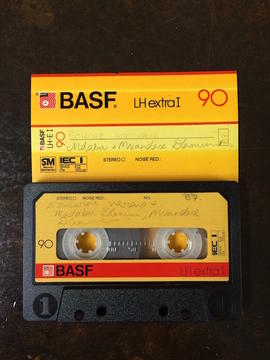
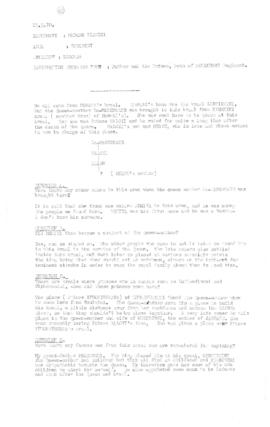
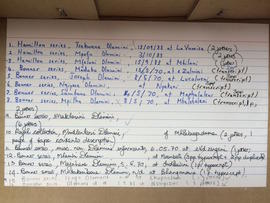
Material contributed by members of the public
Building an archive is a collective endeavour. Please help us grow the FHYA knowledge base.
If you want to add information to this page you can insert a hyperlink, add files and/or text to the box below.
In the case of material relevant to the FHYA as a whole please upload information HERE.
The FHYA does not vet this material but reserves the right to remove anything deemed to be racist, homophobic, sexist or otherwise offensive. Everything on the FHYA is licensed under a Creative Commons CC BY-NC-ND licence.
To make a contribution you must be a registered user. To register an account, click here. Note that after registration you will not be automatically redirected to this page.
If you have already registered but are not logged in, log in here.